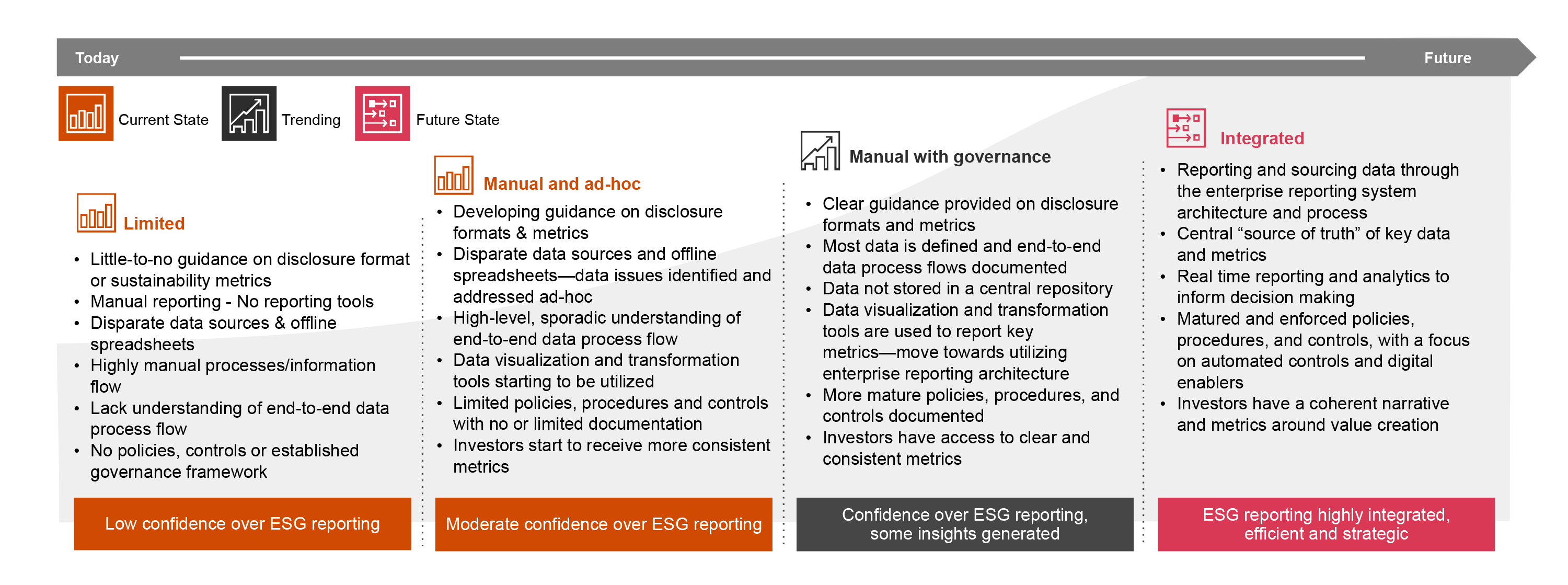In today's business landscape, Environmental, Social and Governance (ESG) factors have become a cornerstone of corporate strategy. ESG not only reflects an organisations’ commitment to sustainability but also influences investors’ decisions, shapes brand reputation and drives long-term value creation. Achieving meaningful progress across ESG initiatives begins with gathering the right data.
Data and data governance stand at the forefront of ESG reporting, making sure that data is accurate, reliable, and transparent. Data governance is central to the "Governance" aspect of ESG, focusing on internal practices, policies, and control mechanisms that guide a company's conduct and ensure accountability.

The importance of data governance to increase reporting confidence
ESG reporting requires organisations to embed ESG reporting into existing business processes and controls, to achieve a more integrated and strategic approach to sustainability. To navigate the complexities of ESG reporting, companies must establish strong data governance frameworks. These frameworks represent a blueprint for enforcing governance. They should provide a clear view of how to ensure the quality, integrity, security, discoverability, accessibility, and usability of your data assets. The key focus of data governance is to have data that is consistent, comparable, reliable and decision useful.
However, implementing a successful data governance strategy can be complex, requiring careful planning and execution. Our Data Strategy & Governance experts at PwC believe there are five must-haves for an effective data governance strategy.
1.
Cross-functional collaboration
Assemble a diverse data governance council bringing representatives from all units and clearly define decision-making processes and escalation paths.
2.
Clear roles and responsibilities
Identify data owners who will ensure data quality and define requirements within their domains. Appoint data stewards to execute governance policies, facilitate communication between data owners and consumers, and monitor data quality.
3.
Comprehensive data governance framework
Define processes and procedures for data governance activities, such as data quality monitoring, issue resolution, access requests, and lifecycle management.
4.
Enabling tools and technologies
Leverage the power of technology to support and enable your data governance initiatives, these tools can include data catalogs for data discovery, data lineage to ensure transparency and traceability, data quality tooling, Master Data Management tools and more.
5.
Cultural transformation
Provide comprehensive training and education programs to foster a data-driven culture and ensure employees understand and embrace data governance principles and practices.
By following a structured approach to data governance, organisations can steer towards increased confidence on their ESG metrics and reporting. The figure below represents the projected evolution from limited reporting to fully integrated reporting, where the importance of a trustworthy and well-developed data governance program increases, leading to more confidence in the ESG metrics and reporting capabilities.

A strong data governance framework validates and standardises ESG data, providing stakeholders with trustworthy information and enabling informed decision-making.
Harnessing innovative technologies
Innovative technologies such as Artificial Intelligence (AI) are revolutionising ESG data management with capabilities like predictive analytics, real-time monitoring and data validation. These solutions empower organisations to improve data accuracy, streamline processes and adapt to the ever-evolving sustainability landscape. Additionally, big data analytics enable the processing and analysis of vast amounts of structured and unstructured data, allowing for more comprehensive ESG reporting. Advanced data visualisation tools also transform complex ESG data into intuitive charts and graphs, building stakeholder understanding and engagement with sustainability performance metrics.
In summary, innovative technologies can support and drive the sustainability journey of your organisation in multiple ways:
1.
Efficiency and cost reduction
Starting from the existing IT landscape, organisations can use technology to streamline operations and help identify areas for optimisation and cost savings, ultimately reducing the environmental impact and operational expenses.
2.
Informed decision-making
Access to reliable data empowers informed decision making, both for strategic and day-to-day decision making.
3.
Innovation and competitive advantage
ESG compliance drives innovation as companies strive to develop sustainable products and services. Strong data capabilities are crucial to identify and adapt to market shifts and capitalise on emerging trends.
4.
Strengthen stakeholder relationships
Transparency in reporting builds trust among stakeholders, enabling stronger relationships with customers, suppliers, and investors.
5.
Customer loyalty and retention
Using data to better understand customer preferences, organisations can tailor their offerings to meet sustainability demands.

Conclusion: Prioritise data governance for sustainable growth
In conclusion, the path to reporting excellence can be a long and intensive journey. Technology needs to be a key pillar to build a robust reporting process, as a foundation for future growth beyond compliance. Establishing clear data management practices and embracing innovative technologies is crucial for navigating the complexities of ESG reporting.
Data governance and management practices, supported by innovative technologies form the foundation for tackling the challenges of ESG reporting. Looking ahead, organisations that prioritise data governance stand to significantly benefit from this approach, as it will result in improved resilience, stronger brand reputation, and increased stakeholder trust. Investing in strong data governance frameworks and innovative technologies not only ensures compliance but also positions organisations for sustained success in a highly evolving business environment.
PwC’s deep understanding of ESG reporting, together with our expertise in technology and data governance, makes us a valuable partner for businesses aiming to embed sustainability at the heart of their strategies. With our guidance in implementing data governance frameworks, companies can ensure that their ESG data is accurate, reliable and robust, laying a solid foundation for informed decision-making and transparent reporting.
Moreover, our commitment to innovation opens the door to cutting-edge technologies like AI, which have the potential to transform your data management capabilities. By harnessing AI tools and analytics, our clients can streamline data collection, enhance predictive capabilities, and uncover insights that drive sustainable business practices.
ESG and Technology
Integrating technology to meet ESG ambitions
ESG, sustainability and climate
Transforming business for a better world













